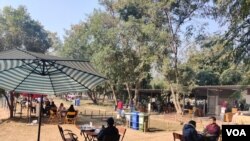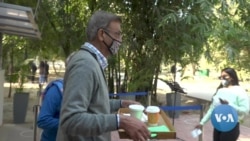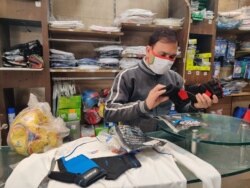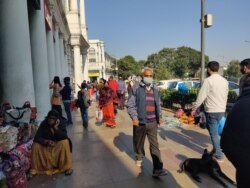At a recently opened café in New Delhi’s biggest park, older visitors pick up a coffee and walk to an isolated spot, while younger ones dine on site, optimistic that the outdoor location makes it safe amid the coronavirus pandemic.
“It’s been a long time and me and my wife decided that it’s time to venture out once in a while,” said Ranjan Khanna, 62, who owns an advertising company in the Indian capital, as he sips his coffee. “Nice sunny day, and it’s been a very nice experience.”
India, which recently recorded more than 10 million cases of COVID-19, the disease caused by the coronavirus, has the second-highest number of cases in the world, behind only the U.S. Yet despite the somber milestone, the country has seen a dramatic dip in daily new infections, which are down to less than one-third of their peak in September, when the daily count topped 95,000.
The decrease in cases has brought a measure of confidence in mega cities like New Delhi, which have been ravaged by the coronavirus. Customers are back in markets, there are long lines outside metro stations and traffic is humming on the streets, giving hope to a recession-hit economy whose main driver is domestic consumers.
“When I was not stepping out at all, I was more scared,” says Yahvi Duggal, a college student who is dining at the café with a friend. “But now since I am going to work, and meeting friends and family, it is getting better.”
That is good news for the café, which opened inside the sprawling park in November, when the Indian capital was witnessing a third wave of infections. While the hospitality industry has taken a huge hit, the cafe's outdoor location is helping to attract customers.
“The response was something not expected. We were out of stock on the very first evening itself before the closing hours,” says Uday Malhotra, head of operations at Fabcafe. “That gave us lot of confidence seeing that people are venturing out in the midst of the pandemic.”
Even though most businesses are still waiting for an increase in customers, they are hoping the worst is over in a country where a stringent lockdown earlier in the year decimated the economy — it is expected to shrink by about 9% this year.
At a sporting goods store in one of Delhi’s most popular markets, less than a dozen customers walk in instead of the 50 it used to see before the pandemic, but it is an improvement from three months ago.
“The good thing is people are still playing carrom. People are still playing badminton. Gymming surged to an extent which we had not imagined, people were buying 100 kgs of dumbbells and setting up their gyms,” says Bhavana Gupta, co-owner of the Gupta Sports House. “But since the grounds are not open, so equipment for football, cricket all these team sports took a hit.”
News that a vaccine may be rolled out early next year is also ushering in hope.
"I personally feel may be in January at any stage or any week, we can be in a position to give the first COVID vaccine shot to the people of India," Health Minister Harsh Vardhan said Sunday.
In the city of 20 million, some residents are optimistic that the pandemic may be waning.
“When you hear of vaccine coming and numbers dipping, you think it is going to happen, maybe in six months or so,” says Sonam Ashok Kumar, a Delhi resident.
But with the city once again on the move, there are fresh warnings from virologists to maintain “COVID behavior,” such as wearing masks and maintaining social distancing, especially amid growing concerns over a new strain of the coronavirus reported to have spread rapidly in Britain.
While the pandemic continues to cast a shadow, people are clinging to a measure of hope.
“The scare is very much there, but life has to go on,” says Khanna, as he takes a walk in the park on a crisp winter morning.








